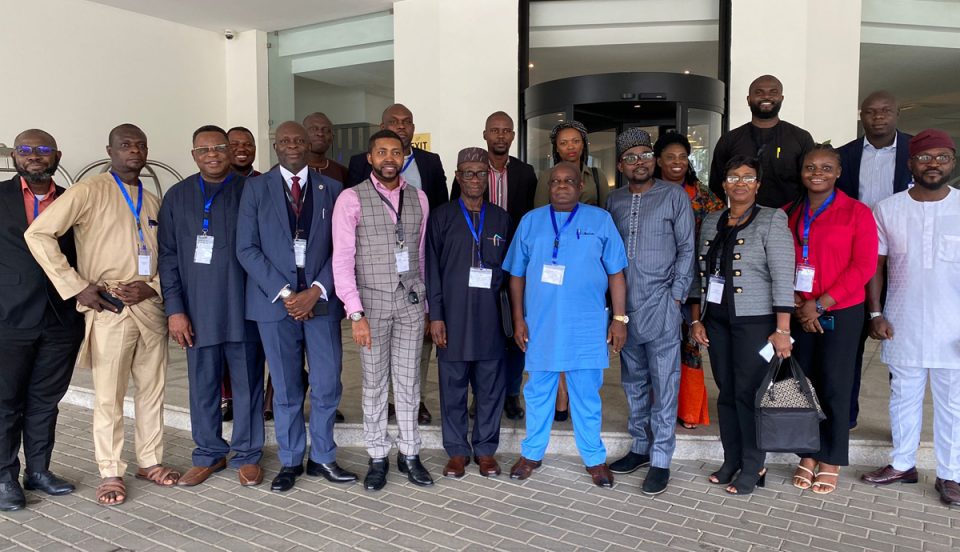As part efforts towards making R&D results in the Africa, especially in Nigeria to solve the industry need, which will in turn lead to GDP growth, Prof. Kirk Semple Director Lancaster, Environment Centre, Lancaster University has 1.5 billion pounds was earmarked as the Global Challenges Research Fund.
Semple who stated this at the Differentiate Nigeria High –level Stakeholders Meeting held in Lagos recently, the fund will go a long way in transforming the African economy.
He pointed out that the project was to stimulate sustainable entrepreneurial thinking for scientists, adding that with this project, that researchers will become business inclined.
Semple stated; “The overall aims and objective are; share our learning of place-based entrepreneurship in African Universities, explore the barriers and opportunities place-based entrepreneurship in African Universities, and to showcase the Stimulating Entrepreneurial Thinking Tool Kits for Scientists and Students (SETSS).
“Lancaster University co-designed, co-developed and have co-delivered two multi-organizational projects with African partners: Recirculate (7 Million Pound Capacity Building Project with five African organizational partners from Nigeria, Ghana, Malawi, Kenya and Botswana. Actuate (700,000 Pound Waste to Energy Demonstrator Plant Development Project with over 10 organizational partners from Nigeria and Ghana). Launched in CSIR-FRI Ghana and delivered in partnership with African partners
“Then Lancaster University won a British Council funding under the Digital Universities Africa programme to develop SETS further.
“In partnership with University of Benin and Igbinedion University Nigeria, Lancaster University Ghana, Kenyatta University Kenya and CSIR Ghana.”
Earlier in his opening speech, the Vice Chancellor of Igbinedion University, Prof. Lawrence Ezemonye, has stated that the rout to industrial development is industry academia interface.
Ezemonye noted the industry is furnished with the R&D results from research institutes, which are solutions that industry needs for growth and development, adding that it will lead to increased productivity, as it will enhance national GDP.
He said; “Industry/Academia interface is the beginning of growth. The industry has their demand and the academia has their philosophy. There is this issue that the graduates from the academia do not ordinarily meet the demand of the industry. For this reason, it became necessary to finding a way to bridge this gap; this gave birth to the partnership between the University of Benin and Lancaster University 10 years ago, propelled by Prof. Kirk Semple, Dr. Akanimo Odon CEO, Envirofly Consulting UK Limited and Myself
“I can authoritatively say that industry academia interface is beginning to gain grounds, and it has spread to university of Lagos, Babcock University and others.”
In his submissions, Dr. Akanimo Odon, CEO, Envirofly Consulting UK Limited, stated that the project became important as Nigeria and African universities have been bedeviled with research challenges.
Odon pointed out that the project is to make researchers entrepreneurial in their thinking, adding that this was to change researchers narrative of publish or perish to research for earning money.
According to him, “The BritishCouncil understands that for Africa to grow, Universities must be solide rubust, so we developed Innovation in African Universities Program called DIFFERENTIATE, which is why Lancaster University partners some of these African universities and applied for this loan.
“In 2013 Africa’s gross expenditure on research and development was about 0.45 percent of GDP, compared with 2.71 percent in North America, 2.10 percent in Southeast Asia 1.75 per- cent in Europe, 1.62 percent in Asia, and 1.03 percent in Latin America and the Caribbean.
“Africa was home to just 2.4 percent of the world’s researchers (1.1 percent for Sub-Saharan Africa and 1.4 percent in North Africa), compared with 42.8 percent in Asia, 31.0 percent in Europe, 18.5 per- cent for North America, and 3.6 percent for Latin America and the Caribbean. “The share of researchers in Germany (4.6 percent), the Republic of Korea (4.1 percent), and France (3.4 percent) is larger than that of the African continent as a whole.”
On his part, a stakeholder, Dr. Chima Igwe who is a former Acting Director General and a Substantive Director of the Department of Chemical, Fibre and Environmental Technology, Federal Institute of Industrial Research, Oshodi (FIIRO) stated that what most scientists need in addition to their professional and technical competence in the field of scientific research for development are the twin areas of entrepreneurial and kinetic thinking.
Igwe noted that it enable the scientist create the much talked about wealth and generate employment using their various fields engagement.




